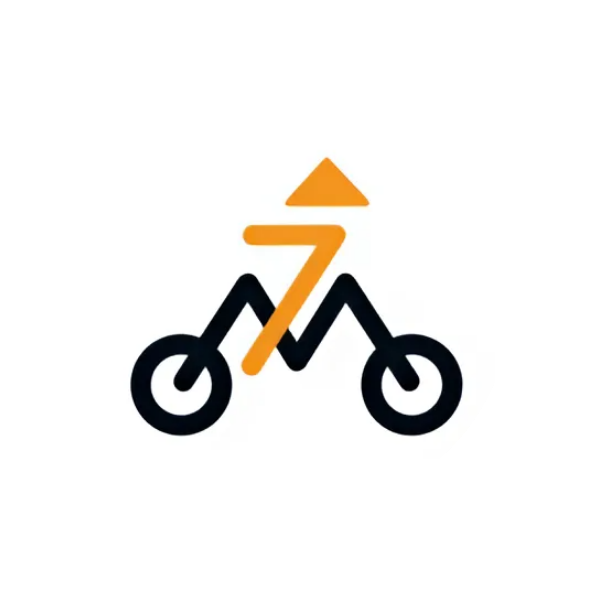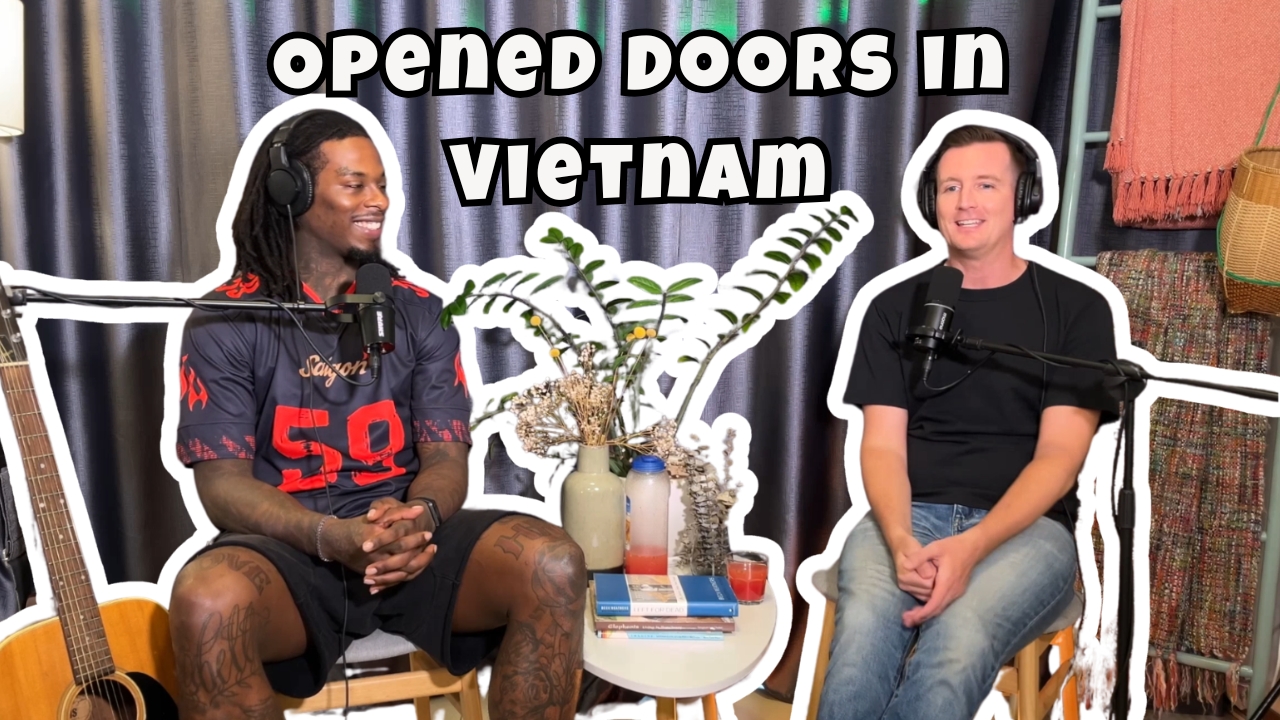A few weeks ago, I went down to District 7 to catch a Saigon Heat game. It was loud, intense, and full of energy, and one player immediately stood out: Davon Dillard. Strong, fast, and totally in command on the court. I knew I wanted to talk to him.
So I did what any modern podcaster would do: I stalked him on Instagram during the game, found his profile, and sent him a message. To my surprise (and excitement), he said yes.
Let’s discover what it’s like to be a pro basketball player in Vietnam, his back story, and how to stay jacked when being a vegetarian like Davon.
Basketball Career & Life in Vietnam
Davon is probably the first basketball player to appear on the podcast. Davon joined the Saigon Heat in April. His first weekend in Saigon, he played in a 3-on-3 tournament at Aeon Mall. It was packed. Fans came from all over to cheer. He said it felt like a playoff game, even though it was the very first one of the season.
That kind of support made it easy for him to say yes when the team asked him to stay and play 5-on-5.
I told him how much Vietnamese people love football, but now they’re also getting into basketball. He agreed. He said basketball is still new in Vietnam, but people really enjoy it. The energy, the back-and-forth action—it’s exciting for everyone. He said fans range from little kids to older adults.
Does Basketball Make You Taller?
Do you think so? I have heard many Vietnamese people talking about this, but I don’t know if it’s a fact.
Then I asked Davon something that made us both laugh. Did he know why young people in Vietnam love basketball so much?
He said no, so I told him the reason: they think it makes them taller!
I used to be an English teacher, and I heard this all the time. Students would say they played basketball or swam because it would help them grow. One friend even said a girl had to quit basketball because her dad thought she was getting too tall.
Davon hadn’t heard that one before, but he found it funny. He said fans don’t ask why he’s tall, but they always ask how tall he is. That’s usually the first question, right after “Where are you from?”
Standing Out in Asia – Being Tall, Black, and Tattooed
We talked about what it’s like for Davon to stand out in Asia. I mean, I’m six foot—not that tall, but tall enough to notice I’m taller than most people in Vietnam. Davon is six-five, and you can imagine the kind of attention he gets.
He told me that in his first two months in China, it felt like all eyes were on him everywhere he went. People stared, sometimes even followed him around or recorded him. But over time, he realized it wasn’t negative—they were just fascinated. You don’t see many people who look like him in that part of the world.
What surprised me was that people even tried to touch his hair. He said it was mostly older women or cute young ladies, so he didn’t mind too much—unless someone just yanked it. Once, at a signing event, a kid actually pulled his hair from behind while sitting on someone’s shoulders. He turned around like, “Where did you come from?”
I shared a similar story, though less extreme. One time, someone touched my nose and said (through a translator), “You have a big nose.” Lovely.
He also shared how in Asia, tattoos are associated with money. A friend of mine—a photographer—once did a shoot with a tattooed white model. All the Vietnamese assistants whispered, “He must be rich.” Tattoos = expensive = must be wealthy.
For Davon, tattoos are personal. He designed them himself. His love of art, fashion, and creativity started young, and tattoos became an extension of that. When his mom saw his first one, she just shook her head and said, “I see this is going to be an issue.” But all his favorite players had tattoos, so it felt natural.
The Nod – The culture among foreigners
This part made me laugh, too. I brought up something I call “the white man nod.” You know, when you see another white guy abroad, you give a little nod—sort of a silent “Hey, I see you.” I asked if Black guys did it too. I remembered chatting with JK Hobson (African American comedian) who said, “Oh yeah, we do that too.”
Deavon shared that he usually always nods back. It’s just how he is. Friendly, open, always ready to greet someone, even a stranger.
From Rock Bottom to Reinvention
I asked Davon about the highs and lows of his journey—and he didn’t shy away from the hard stuff.
One of the first things he said was, “You can Google it.” And sure enough, if you look up his name, one of the first things you’ll find is that he was dismissed from Oklahoma State during his third year. No more scholarship. No more team. No more college.
He told me, “I was just an immature kid. I didn’t take advantage of the opportunities I had.”
He didn’t blame anyone. He took full responsibility. And what stuck with me was his honesty: “It was nobody’s fault but mine.”
He went back home. Slowed down. Reflected.
“I had to mature more as a man. As a leader,” he said.
He started to see things differently. Maybe, he thought, these opportunities weren’t just about him. Maybe they were part of something bigger—something that would let him help others.
Finding Life Beyond Basketball
Davon said that back then, basketball was everything. It defined who he was. Without it, he didn’t know what else he loved.
But when he took a step back from the game, he discovered something else: he loved helping people.
Whenever he gave someone advice—on food, on health, on fitness—it made him feel good. Not just a little good. Really good.
So he leaned in. For months, he barely left the house except to go to the gym. He studied nutrition. Researched. Took notes. He became obsessed—in the best way.
And then the idea hit him: “I should write a book.”
Vegetarian Lifestyle – How Do You Stay Jacked Without Meat?
I couldn’t help but ask the question everyone was probably wondering: how does Davon, a professional athlete with a 12-pack, stay in peak condition on a vegetarian diet?
His answer was simple but smart: be intentional with what you eat, and learn your own body.
He stressed the importance of knowing your blood type—how it affects how your body stores fat, builds muscle, and processes nutrients. Once you know that, you can design a diet that works for you.
For Davon, the key is cooking at home. He shops fresh at local markets, experiments in the kitchen, and treats food like a craft. His roommate gets daily fresh juice, veggie dishes, and whatever Davon is testing that week. Lucky guy.
He said it’s much easier to stay healthy in Vietnam than it was in China. There, food options were limited—mostly noodles or hot pots—and healthy vegetarian options were hard to find unless you were in a big city.
A Real Vegetarian, Not Just “Fish-Sometimes”
When I asked how he became vegetarian, Davon said it wasn’t about sports or health trends. He just never liked meat. As a kid, he’d take one bite of chicken and stop. If he saw a vein or bone—done. His mom used to make him sit at the table until he finished.
What he did love was the garden. His grandmother grew watermelons, cabbage, and more. That’s what he grew up eating.
Before going fully vegetarian, he went pescatarian—eating only fish—but a friend challenged him: just fast, break the cravings, and go all the way. And it worked. A few weeks turned into months, then years.
Even now, surrounded by Caribbean food at family gatherings—curry goat, oxtail, fried everything—he stays disciplined. “I’m at the point where it doesn’t bother me anymore,” he said.
He eats mushrooms every day. Specifically, lion’s mane—great for protein, brain health, and bone strength. He also eats eight eggs daily and gets extra protein from greens, nuts, and fresh juice.
His eating schedule? One big meal around 3 p.m., and then light snacking—nuts, coconut water, juices—for the rest of the day.
Vietnamese Food Hits Different
Although he avoids most of the “good stuff” (aka the meat!), Davon loves Vietnamese food. He’s tried plant-based versions of traditional dishes and even found a few local spots in Thảo Điền, like BE (his team’s sponsor), and a small Mexican place called Simple Place.
He’s picky, but in a good way—he knows what his body likes and what fuels him best. Occasionally, he treats himself, but always stays mindful. “Anybody can burn out from anything,” he said, “so sometimes I cheat a little—just not too far off track.”
Conclusion
Talking to Davon Dillard wasn’t just about basketball. Sure, he’s a standout on the court—but it’s the off-court journey that really left a mark.
From being dismissed from college to publishing books that change lives, from giving up meat as a child to becoming a plant-based powerhouse in Vietnam, Davon is proof that your story doesn’t have to follow a straight line to be powerful.

